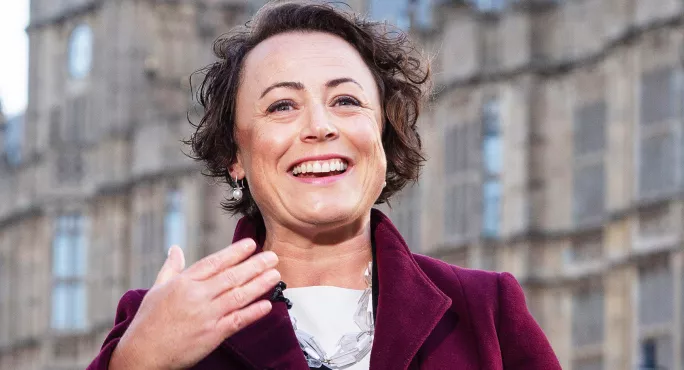Who is shadow schools minister Catherine McKinnell?

Catherine McKinnell is Labour’s shadow minister of state for schools.
If the current opposition party were to win the general election in July and form a government, she may become schools minister.
Catherine McKinnell: who is the shadow schools minister?
Like shadow education secretary Bridget Phillipson, McKinnell hails from the North East of England. She was born in Denton, Newcastle upon Tyne, in 1976, as the third of eight children.
She attended a local comprehensive, Sacred Heart Catholic High School, in Fenham. McKinnell has written on Facebook before how sport was important to her at school, saying: “It kept me active, forged friendships and motivated me to go to school every day.”
After school, McKinnell studied politics and history at the University of Edinburgh. Further study led her down a legal path, completing a law conversion course at Northumbria University.
After qualifying as a solicitor, McKinnell specialised in employment law and worked for former Newcastle-based law firm Dickinson Dees. McKinnell lives in her constituency with her husband and their three children.
Entering Parliament
McKinnell was elected to Parliament at the 2010 general election as the Labour MP for Newcastle upon Tyne North, with just over 40 per cent of the vote and a near-3,500 majority.
On entering Parliament for the first time, she told Tes in 2023 that she “literally” walked in with future boss Bridget Phillipson and said they have “always maintained a lot of shared interests”, including a “shared understanding” of the challenges that the North East region faces.
Shortly after the election, McKinnell was appointed shadow solicitor general until 2011, before she joined the shadow education team from 2011 to 2013, serving as shadow children’s minister.
Between 2013 and 2015, she held the role of shadow exchequer secretary to the Treasury, before being promoted to the shadow cabinet in 2015, where she served as shadow attorney general.
However, she resigned from this position in 2016, citing party infighting and Labour’s direction under Jeremy Corbyn. McKinnell also cited family reasons and her desire to speak in Parliament free of her shadow cabinet legal brief.
Return to the backbenches
After stepping down, McKinnell worked on a number of committees, including as a member of the Commons Education Select Committee from 2016 to 2017 - scrutinising the work of the Department for Education.
From 2020 to 2023, she was chair of the Commons Petitions Select Committee. She has also been a prominent campaigner for the Women Against State Pension Inequality (WASPI) campaign, and was made vice-chair of the recently established all-party parliamentary group on the WASPI campaign.
She is also currently co-chair of the all-party parliamentary group on antisemitism.
Goals for education
Although she didn’t nominate Keir Starmer for Labour leader (nominating Jess Phillips and then supporting Lisa Nandy instead), McKinnell was promoted back to the frontbench in 2023. She took on the role of shadow schools minister in the Labour education team.
In her Tes interview, McKinnell said she wanted to put “the joy of teaching and the joy of learning” back into schools and was determined that Labour would “make headway” on issues such as student mental health and teacher recruitment. She said that she wanted to deliver a “message of hope for teachers”.
However, echoing wider Labour lines about the state of services in the country, she has warned that the party would not be able to “wave a magic wand and fix everything overnight” if it were to win the election.
McKinnell has also slightly distanced herself from debates about the structure of the education system between multi-academy trusts and local authority schools, saying she is more focused on “fixing what’s not working and what is not delivering for children”.
McKinnell has been an outspoken critic of the government’s plan to merge A levels and T levels into the Advanced British Standard, calling it a “back-of-envelope” policy.
Meanwhile, on the subject of Ofsted, McKinnell follows the party line, preferring to reform the inspectorate rather than scrap it. She told a panel at the Labour Party conference in 2023 that Ofsted inspections are “dreaded” by schools and fail to provide useful information to parents.
“We want Ofsted to be less high-stakes and stressful as a process, and more informative for parents - because at the moment it feels like the stakes are really high and it’s not actually delivering information that parents can use,” she argued.
For the latest education news and analysis delivered directly to your inbox every weekday morning, sign up to the Tes Daily newsletter
Keep reading for just £1 per month
You've reached your limit of free articles this month. Subscribe for £1 per month for three months and get:
- Unlimited access to all Tes magazine content
- Exclusive subscriber-only stories
- Award-winning email newsletters
topics in this article



